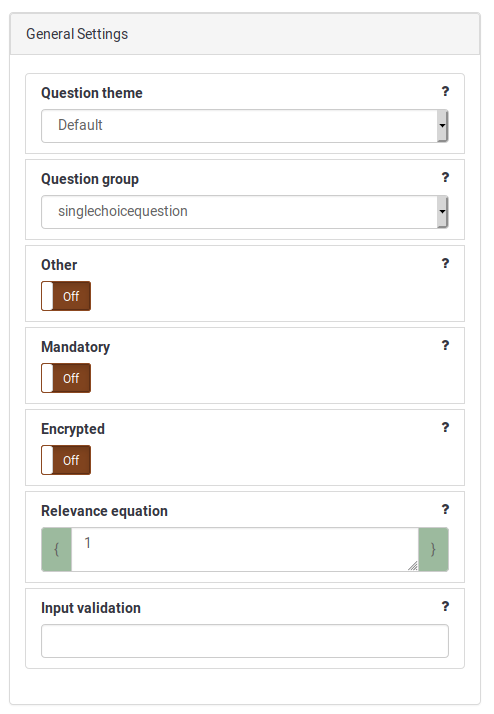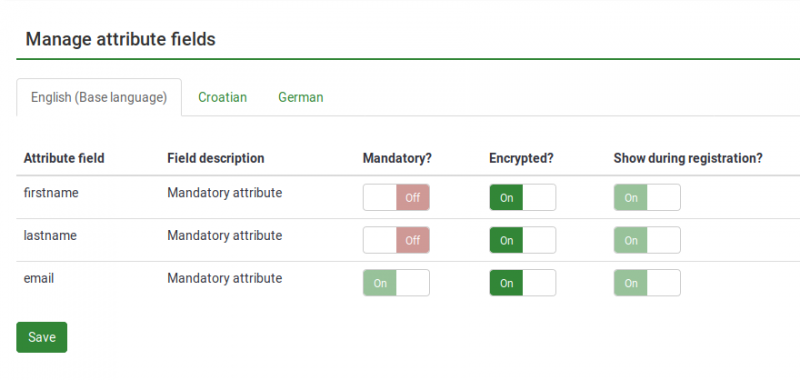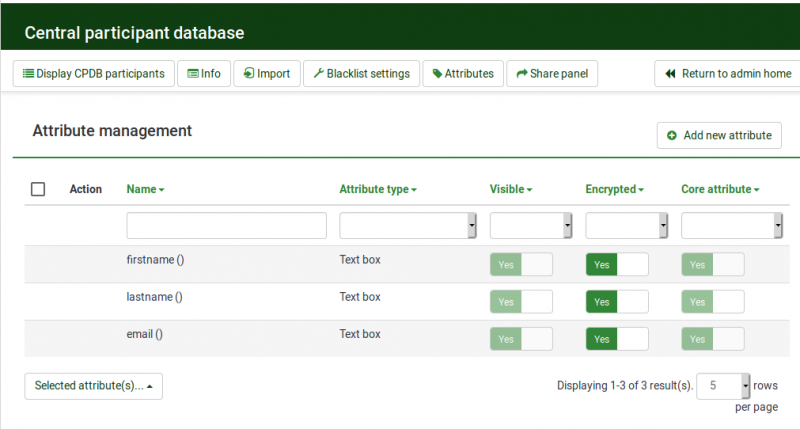Mã hóa dữ liệu
From LimeSurvey Manual
Giới thiệu
Mã hóa dữ liệu là một tính năng mới được cung cấp trong LimeSurvey 4. Nó được tạo ra để giúp quản trị viên khảo sát đối phó tốt hơn với các quy định bảo vệ dữ liệu mới được áp dụng ở nhiều nơi trên thế giới (ví dụ: GDPR).
Tính năng này cho phép mã hóa dữ liệu cá nhân nằm trong cơ sở dữ liệu người tham gia trung tâm và/hoặc bảng người tham gia khảo sát. Ngoài ra, bạn cũng có thể mã hóa dữ liệu bạn thu thập từ người trả lời nếu thuộc tính câu hỏi mã hóa được bật.
Xin lưu ý rằng dữ liệu của bạn sẽ luôn hiển thị trong giao diện LimeSurvey. Chỉ các mục cơ sở dữ liệu mới được mã hóa - không ai truy cập vào máy chủ nơi bạn lưu trữ LimeSurvey có thể hiển thị dữ liệu tương ứng. Do đó, vui lòng chú ý đến người mà bạn cung cấp quyền toàn cầu và khảo sát.
When to encrypt your data?
There is not one correct answer to this question. It heavily depends on:
- the type of data you collect
- where your survey is based on
- national or federal legislation
Most of the time, it is important to encrypt personally identifiable data (e.g., as it is recommended in the General Data Protection Regulation). Therefore, fields such as first name, last name, email address, phone number, address, and so on can be used to identify the responses one person submitted.
In other cases, the data that should be encrypted does not necessarily stop at the examples provided above. In certain scenarios (e.g., in medical research), you might need to encrypt most of your data if you can track back the responses to the person who submitted them.
As a result, please adapt your survey and the data collection to the local legislation!
Settings
There are three places in LimeSurvey where data encryption settings can be set:
Question attributes
Question attribute "Encrypted" is used to enable data encryption for corresponding responses. This attribute is turned off by default. Once survey is activated, it is not possible to change this attribute.

Participant attributes
Three core attributes (firstname, lastname, and email) are always shown in the survey participants table, the encryption being turned on by default.
Each new participant attribute will have encryption turned off by default.
Encryption can be turned on or off at any moment.

Central participant database attribute management
Three core attributes (firstname, lastname and email) are always shown in the central participant database, the encryption being turned on by default.
Each new participant attribute will have encryption turned off by default.
Encryption can be turned on or off at any moment.

Advanced
Sodium library is used to provide data encryption and decryption functionality for LimeSurvey.
Sodium is a modern, easy-to-use software library for encryption, decryption, signatures, password hashing and more. It is a portable, cross-compilable, installable, packageable fork of NaCl, with a compatible API, and an extended API to improve usability even further. Its goal is to provide all of the core operations needed to build higher-level cryptographic tools.
Sodium is cross-platforms and cross-languages. It runs on a variety of compilers and operating systems, including Windows (with MinGW or Visual Studio, x86 and x86_64), iOS and Android. Javascript and WebAssembly versions are also available and are fully supported. Bindings for all common programming languages are available and well-supported.
Version 7.2.0 and newer of the PHP programming language includes the Sodium extension (referred to as ext/sodium) as a core cryptography library. Version 2 of the PHP extension in PECL is compatible with ext/sodium in PHP 7.2.
LimeSurvey uses the Sodium Compat library to bridge with different PHP versions.
This library tentatively supports PHP 5.2.4 - 7.x (latest), but officially it only supports non-EOL'd versions of PHP.
Data encryption/decryption methods used in LimeSurvey are based on public-key signatures. Public and secret keys can be found in /application/config/security.php file. Keys are automatically generated on first usage of encryption feature.
Partial string search won't be possible for database columns with encrypted data, only exact match search.
Errors
Possible errors when using data encryption:
- library doesn't exists: PHP Sodium library have to be installed to be able to use data encryption feature. Here is a guide on how to install library: Sodium installation. If you don't want to use data encryption, you have to disable encryption in attribute settings.
- wrong decryption key: decryption key has changed since data was last saved, so data can't be decrypted. The only way to decrypt data is to retrieve the original key from backup and replace the current decryption key with the original key.
Note: if the wrong decryption key error happens only when LimeSurvey sends an email (e.g. when you concluded a survey), go in Configuration > Global Settings > E-mail settings, and re-insert your STMP password and press Save.[1]
Otherwise, you can still try to compare and eventually recover your decryption keys from a backup (since you do backups... isn't it? Uh?).